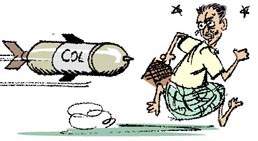| The Sunday Times Economic Analysis By the Economist | ||||||
| |
||||||
|
War ushers bleak economic prospects The behaviour of stock markets and commodity prices is based on a view of the war as well as the expectations of the post war situation. That view may not be vindicated. Time alone will tell. The war would indeed be nasty and brutish. Will it be short? That indeed is the expectation. Yet the consequences of the war may not necessarily be that which is predicted. It can run a course that we cannot predict at the brink of war. Scientists have warned us that there would be no winners or losers in this war, only losers. Dominant economic opinion appears to be vulture like, waiting to pounce upon the remaining economic flesh and distribute it to their advantage. Will the world gain from the war? Would the gains be only to the Texan oil magnates? Perhaps nothing hampers economic growth more than uncertainty. Investors in developed countries were withholding their funds and stock markets were crashing. Consumers were not spending and thereby effective demand was not increasing. Consequently production has to be curtailed, employment was reduced and this in turn led to a reduction in purchasing power and investment. The downturn of industrialised countries and global investment and demand is leading towards an inhospitable economic environment for developing countries, particularly small economies like ours that have a high trade dependency. Until the war is finally over there is very little prospect for the Sri Lankan economy. Any anticipated benefits will not be forthcoming immediately. The economy is likely to suffer this year from the ravages of war. It may be that the consequences of the war may run longer than anticipated. Last year's economic performance has been described as an economic recovery. Perhaps it would be more appropriate to describe it as a modest recovery. It was the sluggishness of the international economy that delayed the recovery. Until the second half of last year there were no signs of recovery. Then there were some improvements. Yet, industrial growth and exports were inadequate to even catch up with the previous year's poor performance. Finally, exports recorded a decline of 2.2 per cent, with industrial exports declining by 2.4 per cent. It is true that the performance in the second half was much better and recorded a significant growth. There were also signs that industrial production and exports were likely to grow as raw material imports had begun to increase. Yet these expectations may be fast disappearing with global economic conditions fast deteriorating. Once again
the Sri Lankan economy is likely to be crippled by the impact of
the war, the rise in oil prices and reduced demand for exports,
in particular. Already tourism in East and South East Asia has suffered
owing to mysterious diseases. The outbreak if war would be a severe
set back to tourism this year. One cannot expect 2003 to be a year
of growth until the war clouds finally disappear and the post war
period is one of restoration with a regime of lower crude oil prices,
peace and prospects of a rapid spurt in spending in the developed
world. This still appears to be a hope than an expectation. Even though an economic growth of 3 per cent is expected, the fundamentals of the economy remain flawed. In 2003 our trade deficit reached a very high 1.4 billion US dollars. The public debt, of which much has been spoken and little done, has increased rather than declined. This despite the privatisation proceeds contributing to the coffers. Unemployment has increased and the cost of living has risen. The fact is that the Sri Lankan economy was unable to even get to the level of the year 2000. Now that 2003 is again a global disaster, the fear is that the economy would slide further. This would be especially so if our industrial export markets decline, tea exports face a severe constraints of shipment, oil prices rise, Middle East remittances decline and tourism is affected by a gulf war. Despite these gloomy economic prospects there is little public awareness of the deep-rooted problems the country is facing. There are even fewer efforts to face these problems through a tightening of the belt and conservation of resources. The entire blame is placed on the government without consideration of the uncontrollable international conditions the country is facing. Blame must be placed on the government for not adequately acquainting the people of the real situation and seeking public co-operation to cope with the problem. Instead it is concessions, increased salary advances, promises of higher salaries, government sustaining losses in petroleum prices and the like that we see. Neither the international context nor the political situation at home is likely to be conducive to economic growth this year. War abroad and continued conflict at home are likely to drag the economy down. |
||||||
Copyright © 2001 Wijeya Newspapers
Ltd. All rights reserved. |
 While
countries were waiting for the war in the Middle East, their economies
were languishing. Stock markets the world over had dipped, oil prices
had risen. With the imminent certainty of war markets have rallied
and oil prices have fallen.
While
countries were waiting for the war in the Middle East, their economies
were languishing. Stock markets the world over had dipped, oil prices
had risen. With the imminent certainty of war markets have rallied
and oil prices have fallen.